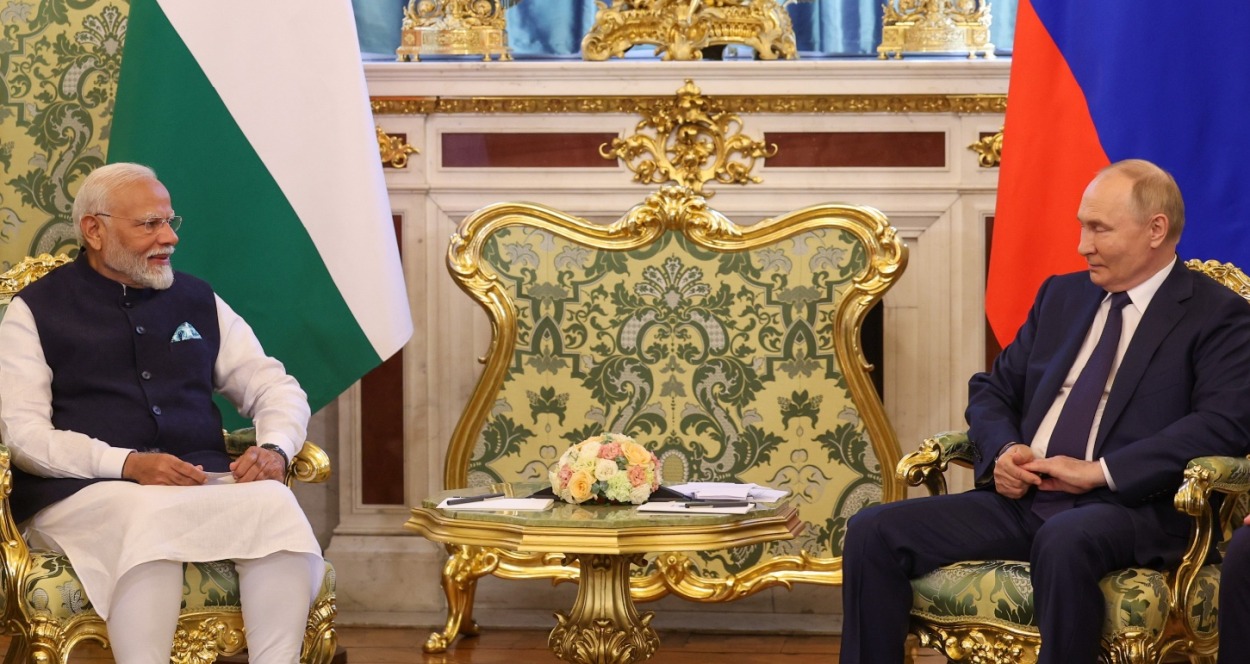India Hugs Russia, Engages China, Partners The US! How Delhi Juggles Its Ties In The New World Order

The recent visit of the Indian PM to Russia has raised many an eyebrow among nations and comments by the strategic community, particularly from the West. They face the fear of India as a swinging power but miss the reality of India as a strategic balancing power with its destination of Viksit Bharat 2047.
While the strategic debate is on a new world order (or disorder), the truth seemingly is unfolding in multiple directions of multi-alignment. Today, we see a widening agenda of multiple orders, which encompasses a new trade order, new energy order, new financial order, new economic order, new environmental order, new human rights order, etc.
So, it’s not the model that is important but its elements that will determine not only war and peace but also global stability. It is here that India emerges as a balanced and mature democracy that seeks global peace, security, and growth with benefits to all.
International Relations In The 21st Century
The 21st Century has been redefined by the US-led Western brand of exceptionalism/unilateralism, Chinese belligerence, Russia’s resurgence, and India’s unprecedented rise in the global arena, sowing seeds of a multipolar strategic contestation, multilateralism, and bilateral relationships driven by national interest.
AfriPrime App link: FREE to download...
https://www.amazon.com/Africircle-AfriPrime/dp/B0D2M3F2JT
This has led to greater dynamism and volatility of international relationships (IR) between states. The art of IR 2.0 is to leverage geopolitical opportunities for the furtherance of national interest, and the science of IR is to decentralize globalization.
IR and liberal international order are not a linear trajectory but it’s all about slants and crosses. Strategic relationships are often driven by economic interests besides security issues, including access to resources, expanding influence, trade connectivity, and markets.
This can lead to economic competition, confrontation, and trade disputes, which affect global economic growth and strategic security. Thus, they present a complex global landscape that demands careful analysis and engagement.
Indian national interests, particularly economic growth, and national security require a multi-aligned diplomatic approach to managing regional and global geopolitics. Its unprecedented rise thus poses both challenges and opportunities in managing multiple bilateral, triangular, and multilateral relationships.
India’s foreign policy acumen lies in balancing the strategic rhombus with Russia, China, and the US, minimizing contradictions, balancing competition, and fostering cooperation.
Geopolitical Opportunism & Strategic Balancing
The evolving geopolitical landscape has placed India at the heart of a complex and dynamic strategic rhombus of the United States, Russia, India, and China (URIC). This configuration is an extension of the inter se relationship between India, Russia, and the United States, with China serving as a crucial common denominator.
It encapsulates the intricate balance of power, strategic instability, and the quest for geopolitical opportunism in contemporary times. India seeks to cement its strategic ties with the USA and strengthen its military and economic ties with Russia while managing the fragility of its relationship with China. This multi-partnership approach allows India to counterbalance China’s growing assertiveness and pursue its national interests.

India’s Strategic Balancing
Russia-India: Enduring Relationship: India’s relationship with Russia remains enduring and strategically evolving based on historical trust, shared national interest, deep defense ties, and a deepening energy relationship.
However, since the Russia-Ukraine war, Russia has become isolated, vulnerable, and driven closer to China, which impacts India’s national security concerns in this transactional partnership. The newfound détente between Russia and China has priorities different than for India and thus discomforting to India. It would be unrealistic for India to expect the same “high value” strategic partnership from Russia, as both Russia and China tilt to a “no limit” partnership between themselves.
As China’s belligerence manifests in the Himalayas and the Indo-Pacific, India has strengthened its political, diplomatic, economic, and military ties with the United States to safeguard its national security and bridge the asymmetry with China.
AfriPrime App link: FREE to download...
https://www.amazon.com/Africircle-AfriPrime/dp/B0D2M3F2JT
This has diluted dependence on Russia, yet mutual respect and understanding prevails. India’s neutral stance in the Russia-Ukraine war further illustrates its delicate balancing act between Russia and the USA, aiming to secure its interests without antagonizing either.
USA-India: Evolving Partnership: India and the US have recently displayed increasing harmony in their bilateral relationship and concerns over containing the rise of a belligerent China. Both have an adversarial relationship with China, categorizing China as the most serious threat to global stability.
Accordingly, the US-India strategic relationship has matured to strengthen a robust architecture in the Indo-Pacific through bilateral trade and military engagement. While India looks upon the USA as an important strategic partner in its multi-alignment strategy, the USA looks at India as a counterweight to China and to tilt the balance in its favor.
The US also becomes important to India in its quest for technology and defense decentralization besides enhanced trade. Thus, the partnership, while evolving strategically, needs to be enduring beyond contradictions with a better understanding of each other’s national interests.
China-India: Distrust and Instability: The relationship between India and China is fraught with distrust and instability essentially due to Chinese hegemonic design. India needs stability with China for an Asian balance of power and to bolster its bid for a permanent seat on the UN Security Council.
The Pakistan-China collusive threat and Russia’s involvement in US-China dynamics further complicate this relationship. India leverages its ties with Russia and the USA to manage China, seeking to balance its interests with both global powers.
EU and India Relations: As India seeks its global footprint and the EU seeks to protect its interests, their collaboration is crucial for global stability and development. Despite initial differences over Russia’s aggression in Ukraine, India has balanced its relationship with the EU with pragmatism and mutual benefit.
The Indo-Pacific dynamics further emphasize the importance of addressing security concerns jointly. This longstanding EU-India partnership, based on shared values and interests, continues to be a key driver of stability and economic growth.

Strategic Implications
India’s geopolitical opportunism and strategic balancing act are crucial in navigating the complexities of this rhombus. Engaging with Russia and China through organizations like RIC, BRICS, and SCO while simultaneously strengthening ties with the USA through QUAD, G-20, and JAI exemplifies India’s nuanced approach.
The relationship is also important for India’s global footprints and connectivity initiatives like INSTC and IMEC. The foundational principles of this strategy include balance of power, ideology, regional security architecture, and deterrence against China’s aggressive revisionism.
The geopolitical dynamics within this strategic rhombus resemble a new Cold War, with ideological contests between democracy (represented by the USA) and autocracies (represented by Russia and China), with India balancing the two.
This competition has intensified the regional arms race, particularly in the maritime domain. QUAD has also emerged as an irritant to China outrightly rejects the idea of the Indo-Pacific and views it from the prism of the containment of China.
The US is also concerned about the rise of China-Russia-Iran as a pole to counterweight the US and dilute its global power status.
Thus, while the evolution of India’s bilateral ties with both nations have been independent of each other, its power-balancing role has gained importance in ensuring regional peace and prosperity.
Conclusion
India’s role in this strategic balancing is pivotal. By maintaining strategic defense and trade ties with Russia, leveraging partnerships with the USA, and engaging China, India aims to achieve a balance that contributes to strategic stability and global peace.
This intricate dance of geopolitical opportunism and strategic balancing underscores India’s quest to navigate its national interests amidst a complex and evolving global landscape.
AfriPrime App link: FREE to download...
- Questions and Answers
- Opinion
- Story/Motivational/Inspiring
- Technology
- Art
- Causes
- Crafts
- Dance
- Drinks
- Film/Movie
- Fitness
- Food
- Jogos
- Gardening
- Health
- Início
- Literature
- Music
- Networking
- Outro
- Party
- Religion
- Shopping
- Sports
- Theater
- Wellness
- News
- Culture
- War machines and policy

